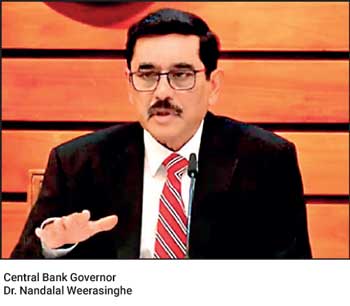Monday Mar 02, 2026
Monday Mar 02, 2026
Saturday, 10 December 2022 00:50 - - {{hitsCtrl.values.hits}}
 The Joint Apparel Association Forum (JAAF) yesterday asserted that its membership strictly abides by the Central Bank laws on repatriating export income, whilst reiterating that the apparel sector brings back the entirety of its export proceeds to Sri Lanka.
The Joint Apparel Association Forum (JAAF) yesterday asserted that its membership strictly abides by the Central Bank laws on repatriating export income, whilst reiterating that the apparel sector brings back the entirety of its export proceeds to Sri Lanka.
Issuing a statement JAAF member companies acknowledged the Governor’s remarks on the need for strict foreign exchange repatriation and conversion requirements over the short term to tide over current economic hardships.
Central Bank Governor Dr. Nandalal Weerasinghe recently affirmed this in an interview on 8 December stating: “Of the exports in September and October, exporters have repatriated or brought 100% of export earnings into our banking system. I want to make it very clear that based on the data for those two months, exporters are not keeping money abroad.”
The Governor also said that in the case of the apparel sector, the industry refers to a local value addition of 50%. The CBSL investigations have confirmed that 25% of export proceedings on average have been directly converted to rupees by the exporters and that the CBSL was looking into the remaining 25% of export proceedings.
He acknowledged, however, that this may be due to exporters utilising these dollars for approved local purchases. These would include the purchase of diesel from both CPC and LIOC and domestically produced raw materials which are required for the industry.
Against this backdrop, JAAF issued a statement reiterating that under the existing regulations set out by CBSL, exporters are permitted to make outward payments for purchases of raw materials, and the remaining proceeds are converted automatically by the respective commercial banks on the seventh day of the following month.
In addition to payments made to overseas suppliers, the growth of the local supply chain also means that apparel companies could pay up to 25% of their inward foreign currency remittances to indirect exporters in Sri Lanka.
As mentioned by the Governor, these additional dollar payments may not be accounted for properly which has led to misconceptions surrounding the industry’s foreign exchange conversions.
“Given the current economic situation in the country, companies use a considerable portion of export proceeds to purchase raw materials, fuel and other items essential for seamless operations in the event of unforeseen crises. This is aligned with a preparedness formula which nearly all exporters have implemented, having learned lessons from crises experienced in the last three years,” JAAF said.
Reiterating that the industry has been a mainstay in contributing towards vital essentials for the country including fuel, medicine and food during the worst of the financial crisis, JAAF members are acutely conscious of the crucial role they play in keeping the economic wheels turning. The Governor also placed on record his appreciation to the apparel sector for its continued support.
“We are confident that companies in our membership have been abiding by the law, ensuring that export proceeds are repatriated for the economic benefit of the country. JAAF member companies have and will continue to comply with the existing regulations and will strive to complement all efforts taken by the Central Bank of Sri Lanka and the Government in providing much-needed assistance to all stakeholders of the economy, to redirect Sri Lanka’s economy to a path of recovery and growth,” JAFF added.
The Governor also spoke of reconciling the exports of the top 100 exporting companies to establish both the direct conversion and the amounts paid in foreign currency to local suppliers. JAAF is committed to working with CBSL to ensure that this reconciliation is done at the earliest.
JAAF also commended the Governor’s remarks on the need to periodically relax the repatriation and conversion requirements “as it does not work” and move towards creating a suite of positive incentives that will encourage voluntary repatriation and conversion in line with global standards and practices.